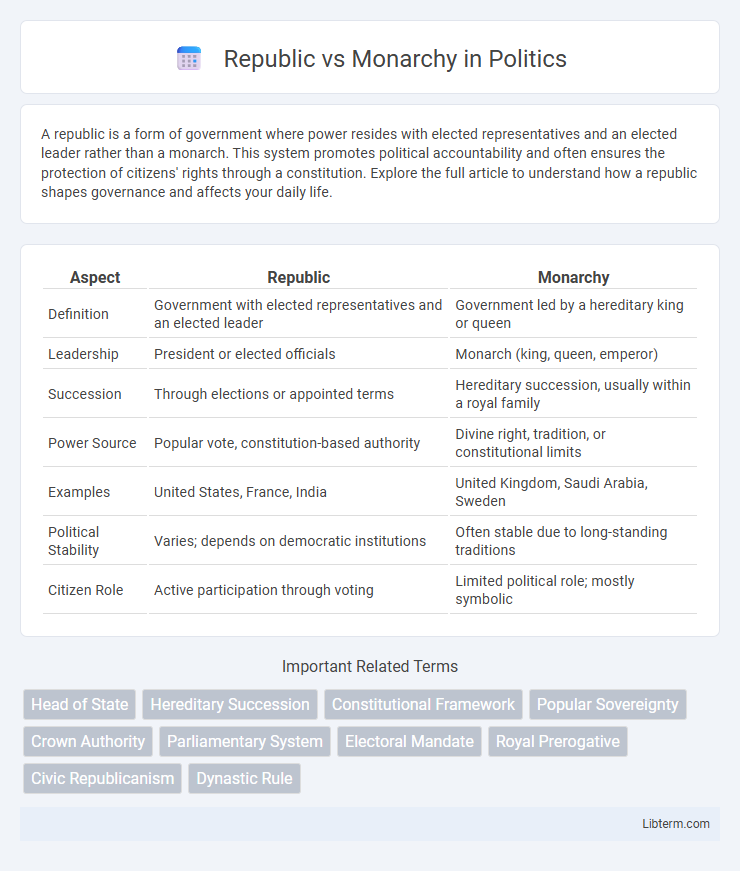A republic is a form of government where power resides with elected representatives and an elected leader rather than a monarch. This system promotes political accountability and often ensures the protection of citizens' rights through a constitution. Explore the full article to understand how a republic shapes governance and affects your daily life.
Table of Comparison
| Aspect | Republic | Monarchy |
|---|---|---|
| Definition | Government with elected representatives and an elected leader | Government led by a hereditary king or queen |
| Leadership | President or elected officials | Monarch (king, queen, emperor) |
| Succession | Through elections or appointed terms | Hereditary succession, usually within a royal family |
| Power Source | Popular vote, constitution-based authority | Divine right, tradition, or constitutional limits |
| Examples | United States, France, India | United Kingdom, Saudi Arabia, Sweden |
| Political Stability | Varies; depends on democratic institutions | Often stable due to long-standing traditions |
| Citizen Role | Active participation through voting | Limited political role; mostly symbolic |
Defining Republics and Monarchies
Republics operate as political states where the head of state is elected or appointed, often emphasizing citizen participation and rule of law, with power typically distributed across branches of government. Monarchies center around a hereditary sovereign, such as a king or queen, whose authority can range from absolute control to constitutional limitations within established legal frameworks. Defining republics involves analyzing representative governance and codified constitutions, while defining monarchies involves understanding dynastic succession and traditional institutional roles.
Historical Origins of Republics and Monarchies
Republics originated in ancient civilizations such as Rome, where power was held by elected representatives and institutions rather than a single ruler. Monarchies trace back to early tribal societies and ancient kingdoms, with authority centralized in hereditary kings or queens who often claimed divine right. The historical evolution of republics emphasized civic participation and legal frameworks, while monarchies evolved through dynastic succession and territorial control.
Key Principles of a Republic
A republic is characterized by the principle of popular sovereignty, where power resides with the people who elect representatives to govern on their behalf. It emphasizes the rule of law, ensuring that all citizens and leaders are subject to the same legal framework, preventing arbitrary rule. Key elements include separation of powers, checks and balances, and protection of individual rights to maintain accountability and prevent tyranny.
Core Characteristics of Monarchies
Monarchies are defined by a single ruler, often hereditary, who holds supreme authority over the state, such as kings, queens, or emperors. This centralized power is typically maintained through a combination of tradition, lineage, and a legal framework that legitimizes the monarch's role, with limited or no input from the general populace. Monarchies may be absolute, where the monarch has unrestricted control, or constitutional, where their powers are regulated by a constitution or parliamentary system.
Political Power: Distribution and Limitations
Republics typically distribute political power through elected representatives and institutional checks and balances, ensuring limitations on authority to prevent autocracy. Monarchies centralize political power in a single ruler or royal family, often with hereditary succession, where limitations vary widely from absolute authority to constitutional restrictions. The degree of political power distribution fundamentally shapes governance dynamics, accountability, and citizen participation in each system.
Leadership Selection: Elected vs. Hereditary
Republics select leadership through elections, allowing citizens to vote for representatives or executives based on merit and popular support. Monarchies rely on hereditary succession, where leadership is passed down within a royal family, often limiting power transfer to lineage rather than public choice. Electoral processes in republics promote accountability and adaptability, contrasting with monarchies' emphasis on tradition and stability through established bloodlines.
Law, Rights, and Citizen Participation
Republics emphasize rule of law where laws apply equally to all citizens, ensuring protection of individual rights through constitutions or charters. Citizen participation in republics is active and direct, often involving voting, referenda, and elected representatives who formulate laws reflecting the public will. In monarchies, legal authority frequently derives from the sovereign, with limited or symbolic citizen rights and participation, as decision-making power is concentrated in the monarch or ruling family.
Societal Stability and Change
Republics often promote societal stability through representative governance and the rule of law, allowing for systematic political participation and accountability. Monarchies can provide continuity and stability by maintaining traditional structures and symbolic unity, though they may resist rapid societal change. Both systems influence societal change differently: republics encourage reform through elected institutions, while monarchies may change more gradually, rooted in heritage and established authority.
Global Examples and Current Trends
Republics like the United States, India, and Brazil dominate global governance by emphasizing elected representation and constitutional law, ensuring citizen participation and accountability. Monarchies, such as the United Kingdom, Sweden, and Saudi Arabia, maintain varying degrees of ceremonial or absolute power, with constitutional monarchies balancing tradition and modern governance. Current trends show a gradual decline in absolute monarchies, while republics increasingly adopt democratic reforms and digital governance to enhance transparency and public engagement.
Republic vs Monarchy: Pros, Cons, and Public Perception
Republics promote democratic governance with elected representatives, ensuring accountability and citizen participation, while monarchies offer political stability and continuity through hereditary leadership. The pros of republics include greater political freedom and transparency, contrasted with monarchies' efficiency in decision-making and preservation of tradition; however, republics may face political fragmentation and monarchies risk authoritarianism. Public perception varies widely, with republics favored for fairness and equality in modern societies, whereas monarchies often enjoy support for cultural heritage and national identity despite criticism for lack of representation.
Republic Infographic

 libterm.com
libterm.com